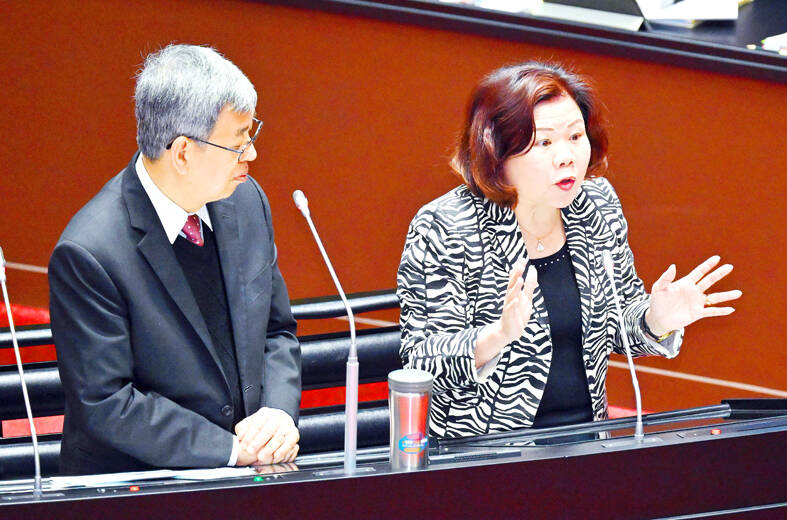Minister of Labor Hsu Ming-chun (許銘春) yesterday apologized for her comments on the planned recruitment of Indian migrant workers that have been labeled as “racist” by some Indian media outlets.
Taiwan and India on Feb. 16 signed a memorandum of understanding signaling a willingness to make India a source of migrant workers.
In an online interview about the plan with talk show host Wang Shih-chih (王時齊) on Monday, Hsu said the ministry would first recruit Indian workers from northeastern India because “their skin color and dietary habits are closer to ours.”

Photo: Liao Chen-huei, Taipei Times
In addition, the Indians there are “mostly Christians” who are adept at manufacturing, construction and farming, Hsu said, explaining that the strategy was based on Ministry of Foreign Affairs assessments.
At the legislature yesterday morning, Hsu apologized for her “inaccurate” comments that caused “misunderstanding.”
The nation’s labor policies, whether directed at local or foreign workers, are crafted with equality in mind and are never discriminatory, she said.
She praised Indian workers’ abilities and performance in the interview because she hoped to highlight these attributes, she added.
Hsu’s comments drew criticism from Legislator Chen Kuan-ting (陳冠廷) of the Democratic Progressive Party, who in a video posted on social media “strongly condemned” her comments, arguing that skin color and race should not be criteria for recruiting migrant workers.
In a statement issued late on Monday, the Ministry of Labor apologized for Hsu’s “inaccurate” choice of words, saying that the minister’s comments were not meant to be discriminatory.
Some Indian news outlets reported Hsu’s remarks after the ministry issued the apology, with at least one branding them as “racist.”
In a statement yesterday, the Ministry of Foreign Affairs also apologized for what it called “less than appropriate” narratives by government agencies regarding the planned recruitment of Indian workers that sparked criticism internationally and domestically.
The plan has been controversial since Bloomberg first reported in November last year that “Taiwan could hire as many as 100,000 Indians to work at factories, farms and hospitals.”
Hsu denied the report, calling stories related to it “fake news,” but she has not put a number on the potential number of migrant workers from India.
At the time, Hsu urged people not to discriminate against specific nations.

The first two F-16V Bock 70 jets purchased from the US are expected to arrive in Taiwan around Double Ten National Day, which is on Oct. 10, a military source said yesterday. Of the 66 F-16V Block 70 jets purchased from the US, the first completed production in March, the source said, adding that since then three jets have been produced per month. Although there were reports of engine defects, the issue has been resolved, they said. After the jets arrive in Taiwan, they must first pass testing by the air force before they would officially become Taiwan’s property, they said. The air force

The Coast Guard Administration (CGA) yesterday said it had deployed patrol vessels to expel a China Coast Guard ship and a Chinese fishing boat near Pratas Island (Dongsha Island, 東沙群島) in the South China Sea. The China Coast Guard vessel was 28 nautical miles (52km) northeast of Pratas at 6:15am on Thursday, approaching the island’s restricted waters, which extend 24 nautical miles from its shoreline, the CGA’s Dongsha-Nansha Branch said in a statement. The Tainan, a 2,000-tonne cutter, was deployed by the CGA to shadow the Chinese ship, which left the area at 2:39pm on Friday, the statement said. At 6:31pm on Friday,

The Chinese People’s Liberation Army Navy’s (PLAN) third aircraft carrier, the Fujian, would pose a steep challenge to Taiwan’s ability to defend itself against a full-scale invasion, a defense expert said yesterday. Institute of National Defense and Security Research analyst Chieh Chung (揭仲) made the comment hours after the PLAN confirmed the carrier recently passed through the Taiwan Strait to conduct “scientific research tests and training missions” in the South China Sea. China has two carriers in operation — the Liaoning and the Shandong — with the Fujian undergoing sea trials. Although the PLAN needs time to train the Fujian’s air wing and

STRIKE: Some travel agencies in Taiwan said that they were aware of the situation in South Korea, and that group tours to the country were proceeding as planned A planned strike by airport personnel in South Korea has not affected group tours to the country from Taiwan, travel agencies said yesterday. They added that they were closely monitoring the situation. Personnel at 15 airports, including Seoul’s Incheon and Gimpo airports, are to go on strike. They announced at a news conference on Tuesday that the strike would begin on Friday next week and continue until the Mid-Autumn Festival next month. Some travel agencies in Taiwan, including Cola Tour, Lion Travel, SET Tour and ezTravel, said that they were aware of the situation in South Korea, and that group